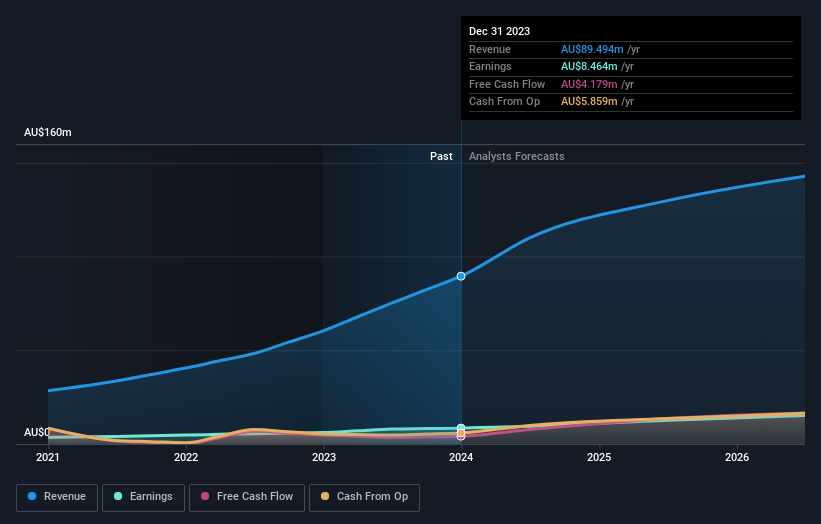With 49% ownership, COSOL Limited (ASX:COS) insiders have a lot riding on the company's future
Key Insights
Insiders appear to have a vested interest in COSOL's growth, as seen by their sizeable ownership
52% of the business is held by the top 6 shareholders
Using data from company's past performance alongside ownership research, one can better assess the future performance of a company
A look at the shareholders of COSOL Limited (ASX:COS) can tell us which group is most powerful. And the group that holds the biggest piece of the pie are individual insiders with 49% ownership. In other words, the group stands to gain the most (or lose the most) from their investment into the company.
So, insiders of COSOL have a lot at stake and every decision they make on the company’s future is important to them from a financial point of view.
Let's delve deeper into each type of owner of COSOL, beginning with the chart below.
Check out our latest analysis for COSOL
What Does The Institutional Ownership Tell Us About COSOL?
Many institutions measure their performance against an index that approximates the local market. So they usually pay more attention to companies that are included in major indices.
Institutions have a very small stake in COSOL. That indicates that the company is on the radar of some funds, but it isn't particularly popular with professional investors at the moment. If the business gets stronger from here, we could see a situation where more institutions are keen to buy. It is not uncommon to see a big share price rise if multiple institutional investors are trying to buy into a stock at the same time. So check out the historic earnings trajectory, below, but keep in mind it's the future that counts most.
Hedge funds don't have many shares in COSOL. Looking at our data, we can see that the largest shareholder is Stephen Edward Johnston with 14% of shares outstanding. For context, the second largest shareholder holds about 14% of the shares outstanding, followed by an ownership of 13% by the third-largest shareholder. In addition, we found that Scott McGowan, the CEO has 2.8% of the shares allocated to their name.
We also observed that the top 6 shareholders account for more than half of the share register, with a few smaller shareholders to balance the interests of the larger ones to a certain extent.
Researching institutional ownership is a good way to gauge and filter a stock's expected performance. The same can be achieved by studying analyst sentiments. While there is some analyst coverage, the company is probably not widely covered. So it could gain more attention, down the track.
Insider Ownership Of COSOL
The definition of an insider can differ slightly between different countries, but members of the board of directors always count. The company management answer to the board and the latter should represent the interests of shareholders. Notably, sometimes top-level managers are on the board themselves.
I generally consider insider ownership to be a good thing. However, on some occasions it makes it more difficult for other shareholders to hold the board accountable for decisions.
Our most recent data indicates that insiders own a reasonable proportion of COSOL Limited. Insiders own AU$101m worth of shares in the AU$206m company. It is great to see insiders so invested in the business. It might be worth checking if those insiders have been buying recently.
General Public Ownership
The general public, who are usually individual investors, hold a 32% stake in COSOL. While this size of ownership may not be enough to sway a policy decision in their favour, they can still make a collective impact on company policies.
Private Company Ownership
We can see that Private Companies own 14%, of the shares on issue. It's hard to draw any conclusions from this fact alone, so its worth looking into who owns those private companies. Sometimes insiders or other related parties have an interest in shares in a public company through a separate private company.
Next Steps:
While it is well worth considering the different groups that own a company, there are other factors that are even more important. Consider risks, for instance. Every company has them, and we've spotted 1 warning sign for COSOL you should know about.
If you would prefer discover what analysts are predicting in terms of future growth, do not miss this free report on analyst forecasts.
NB: Figures in this article are calculated using data from the last twelve months, which refer to the 12-month period ending on the last date of the month the financial statement is dated. This may not be consistent with full year annual report figures.
Have feedback on this article? Concerned about the content? Get in touch with us directly. Alternatively, email editorial-team (at) simplywallst.com.
This article by Simply Wall St is general in nature. We provide commentary based on historical data and analyst forecasts only using an unbiased methodology and our articles are not intended to be financial advice. It does not constitute a recommendation to buy or sell any stock, and does not take account of your objectives, or your financial situation. We aim to bring you long-term focused analysis driven by fundamental data. Note that our analysis may not factor in the latest price-sensitive company announcements or qualitative material. Simply Wall St has no position in any stocks mentioned.

 Yahoo Finance
Yahoo Finance 

